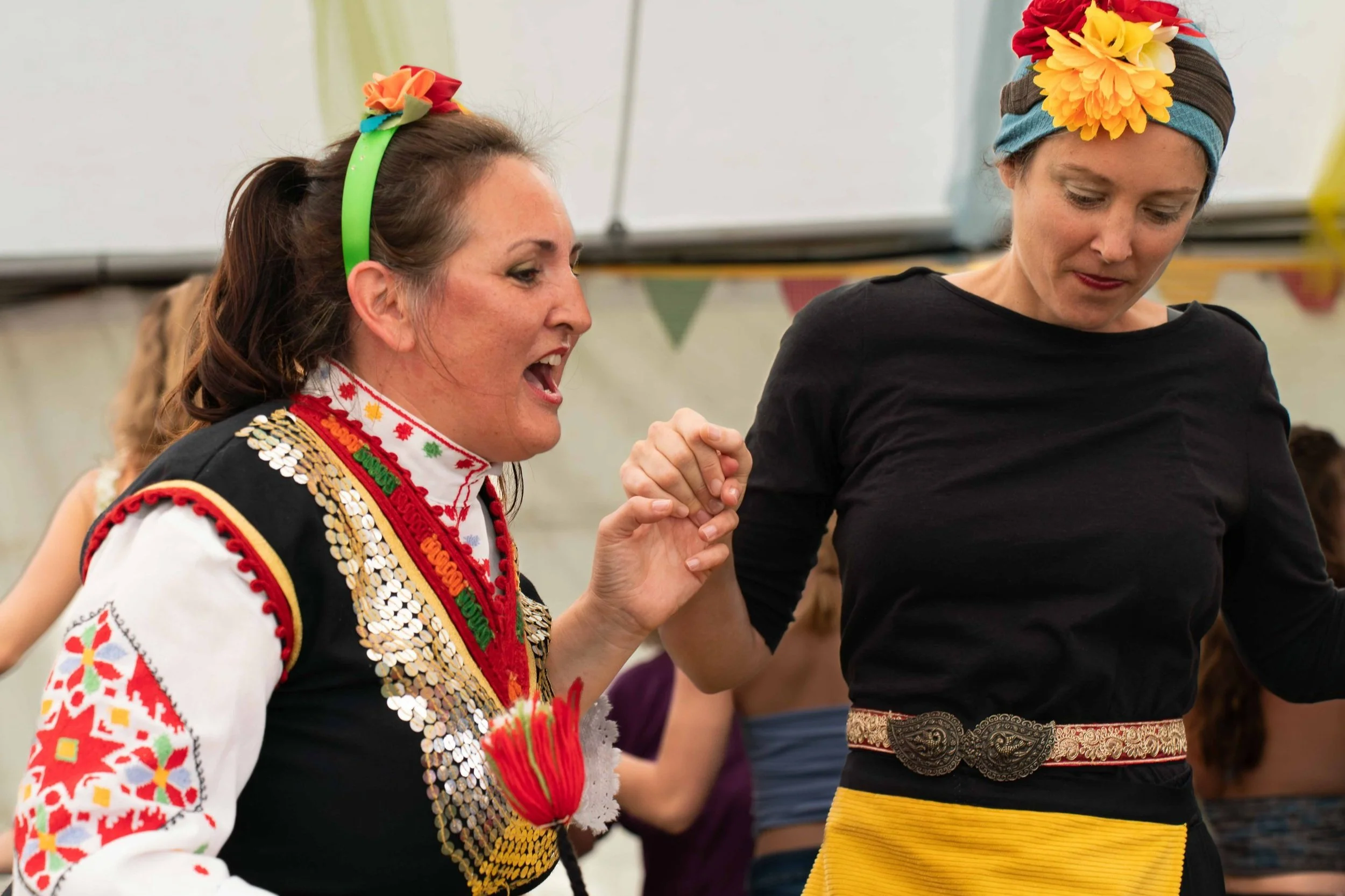Interview with Tui Mamaki
Songleader, Songwriter, Singer, Holder of traditional Bulgarian women’s song
photo credit Den O’Keefe - Auckland Folk Festival 2025
Tui and I engaged in several voice memos to and fro, trying to formulate the forging of an article describing her new project and trip back to Bulgaria with Medena Ensemble. Time, circumstances and availability led us to the interesting ‘interview’ process of me transcribing voice memos from Tui on the move…
It proved to be an enjoyable way to do it. I could settle into her poetic language carefully at my own pace, phone listening in one hand, keyboard on laptop, the other.
Transcription follows, with a few bit added in by me here and there.
For those of you new to the bewitching talent that is Tui Mamaki, and her dedication to honouring traditional folk music with her singing groups, I recommend reading the last SLNA article here, featuring Medena Ensemble, and a visit to her website for musical/artistic context is well worth it.
”Going to Bulgaria in 2014 was a deeply personal, life changing, 4 year immersive experience. After a decade of being in The Mamaku Project with amplification and loud instruments, I was on a solitary quest for more space for the voice. I entered into a phenomenal relationship with an acapella tradition that has space for anywhere between one and 40 voices.
In Bulgaria, women’s song is perceived to be very profound. The title for our concert on June 8th, reflects this. Women who carry song are deemed to be the daughters of Orpheus. They hold a lineage that preceded them and will outlive them. They say “song is needed for the wellbeing of our spirits, and for this time we share on earth, they can be on tap. If you need a song, you can go and get one”.
This emotional accessibility and the cultural, spiritual significance given to the tradition of women’s song, felt like a welcome home for me.
The slow transmission, sitting down at kitchen table with a humble woman who carries songs from her ancestors, being willing and ready to share with me, was time out - of the race, the ego. The process of oral tradition - calling and responding, was often with near to no explanation, just her voice. Afterwards I would transcribe and analyse the songs as a way of integrating what I had heard and instinctively mirrored. Everything I have brought back to Aotearoa, every arrangement I have made, has been the product of my personal relationship with those women and the songs, through my lens.”
Costumed Singers at Koprivshtitsa 2015, photo Tui Mamaki
If we in the west are somewhat familiar with the haunting sound of Bulgarian women’s song, it is likely we will have come to it through ‘Le Mystère des Voix Bulgares’, The Bulgarian Women's State Choir, popularised through singers like Kate Bush and Lisa Gerrard - assisting their international recognition.
“Although their exquisitely arranged classics are deservedly enduring and most celebrated, and this is the place to start, I feel this connection by the west is so reductive. For me it's about the individual women & local dialects, and the idiosyncrasies of regional systems, that I love.”
When first being introduced to the music, the specific vocal tone, sound placement and rhythms are intriguing.
“They are foreign to our western bodies. Many people have no idea that what they are listening to is an odd meter, they just like it. Neravnodelni Ritme - translating as ‘asymmetrical/not evenly cut.’ describes the feeling of these rhythms.
Odd meters, (often taught in relation to fruit - ‘apple apple pineapple’) are a practice in responsiveness and trust, and have become an important pursuit of study for myself and my students. How to become comfortable in the sensation of losing ground, like having to think upside down. Developing the agility of being able to snap into the grounding beats of a cycle and inhabit the levity of the cluster of three, changing time and gravity.”
photo credit Den O’Keefe - Auckland Folk Festival 2025
In sharing Bulgarian song here in Aotearoa, Tui marvels at how unusual it is to have this growing dedication within this vocal community.
“Gathering around the love of this music in my kete, women resonate with the fascination and intensity that I have, in my devotion to the pursuit of sound, blend and beauty. In the space they create for this, they encounter their own reason to make this connection to the music and the culture.
This musical journey with Medena is taking on a life of its own, a coming of age, and this first trip back to Bulgaria with these Medenki (little honeyed ones) is quite significant. Each woman is creating a space big enough within themselves to want to make that connection, and will develop a relationship to Bulgaria that is their own.”
photo credit Den O’Keefe - dancing at the Folk festival 2025
“This trip gives us a new reason to grow - this new domain of demanding more, the fast growth curves for both the singers and myself is exhilarating, as we prepare to take this music back to the country that it came from. We will also carry a couple of Māori waiata by Hirini Melbourne, to Bulgaria as a gift in musical exchange.”
For the women who are Medena Ensemble, coming together to sing, learn, love and support each other in low times of hardship & highs of joy, builds a community of belonging, creating an endurance that continues to deepen.
Preparing backstage at the World Choir games 2024
“It is the breath that releases it to the world
The song lines belong to the before and the after
Beyond a single body, beyond a single mind -
As we exhale through song, the trees breathe it in
And in turn, their oxygen sustains the song lines
Of another generation, in fact we breathe the breath
Of our ancestors, in concentric circles of surrender”
Tui Mamaki
https://www.youtube.com/@MedenaEnsemble
Anna Pendred





